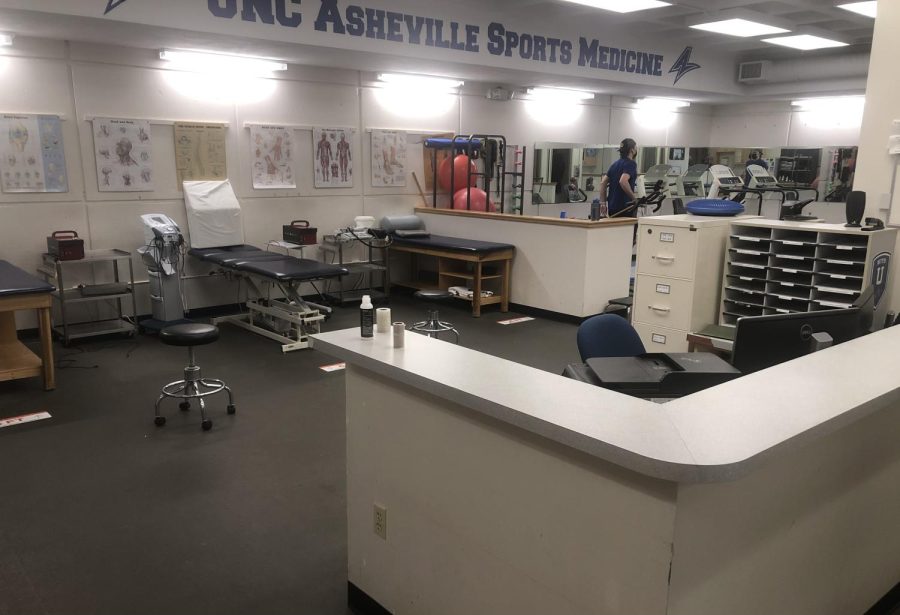Winter sports season begins as UNC Asheville athletics face new COVID protocols
A student complies with COVID-19 protocols by wearing a mask while at the training room in the Justice Center.
February 11, 2022
With winter sports already underway, the NCAA and UNC Asheville have updated their COVID-19 guidelines for the winter sports season.
“We are following guidelines from the NCAA resocialization of collegiate sport. Even with certain teams not in season, 2022 winter training and competition are the guidelines we follow,” said Tim White, head athletic trainer at UNCA.
According to White, a positive COVID test forces student-athletes into isolation for five days. If a player experiences no symptoms or symptoms are resolved after five days, isolation may end.
Following the five-day quarantine, the student-athlete must continue wearing a well-fitting mask around others for five additional days. If the player has a fever still, they must continue to isolate until the fever resolves.
“If you are in close contact with a player, you have to quarantine the same number of days as the player and show a negative test result before returning to training. This is why we always have to be extra cautious of who we are with and where we are,” said Grant Stidham, senior on the men’s soccer team.
Updated guidelines from the NCAA hinge greatly on student-athlete vaccination status while also taking COVID immunity into consideration.
According to the new guidelines, having a booster shot makes for more flexible guidelines for players potentially exposed to someone with COVID.
“The main difference with student-athletes having a booster vaccine is regarding quarantine after close contact. If the athlete has a booster, no need to quarantine, just monitor symptoms and test around day five. If the student-athlete has not received their booster, they must quarantine for five days after close contact,” White said.
Student-athletes have the right to not be vaccinated or partially vaccinated, but they must follow stricter guidelines than student-athletes who are fully vaccinated.
“The updated guidelines by the NCAA also extend to close contact. Student-athletes who are not fully vaccinated need to quarantine at home for five days with no participation in athletic activities. They will then need to wear a face mask for five additional days,” White said.
According to White, the procedures are no different for a team in season than a team in their off-season. However, in-season teams may travel to places that have their own requirements in place above the NCAA guidelines.
“During a week with no competition, the team must have weekly PCR/NAAT testing or three-times-a-week antigen testing. During a week where the team will be competing, a PCR/NAAT test is required within three days of the first competition of the week,” White said.
According to NCAA guidelines, getting student-athletes tested will depend on their vaccination status.
“We are all vaccinated with some players on the team having the booster shot. Not much has changed from previous semesters, just the amount of days you must quarantine,” said Sean McGinty, senior on the men’s soccer team.
Teams currently not in season right now have not been getting tested frequently.
“We have not been getting tested, but I believe that is because our team is in the off-season and we are not seen as an important sport at the moment. We have been tested once when all of us got back into town. After that, nothing at all,” Stidham said.
UNCA student-athletes said they are required to wear face masks when in the weightroom as well as traveling for game day.
“The protocol that bothers me is the mask while lifting inside. It doesn’t affect my breathing like some individuals, but I find it just annoying and in the way while lifting. I feel it interferes with my ability to get max effort during my lift,” Stidham said.
According to White, student-athletes only have to wear a mask outside the weight room or when traveling when the athlete has a recent positive test. They will then need to use a face mask around others until day 10, unless they produce a negative test after the isolation has ended. However, teams still use mask enforcement in indoor spaces according to UNCA school guidelines.
“The new variant has been challenging. While severe illness has decreased with this variant and more people are vaccinated, the number of cases has been high due to the increased transmission rate of the variant,” White said.
With omicron emerging on every campus across the country, student-athletes have to take extra precautions in order to avoid quarantining.
“It does not affect me much, but there are always those guys on the team who put themselves at risk. We can get tested especially if we feel the slightest change in our health. If someone on the team gets it, usually they and their roommates will test and isolate if needed. That’s how easy it can spread,” McGinty said.


















